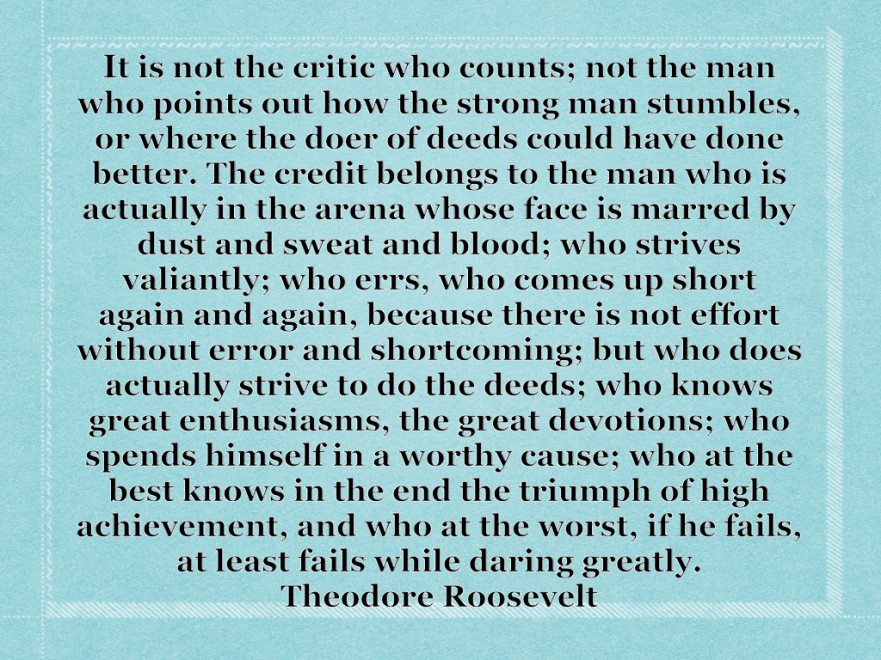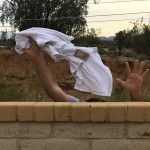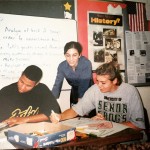I have an assignment for you: Look in the mirror and say, slowly and convincingly, “I am a teacher leader.”
Feel weird?
It did to me for a LONG time. I didn’t see myself as a leader; I was “just the music teacher.” I fulfilled my campus duties, hiked to the back 40 to my classroom, taught my lessons, and kept myself off of everyone’s radar. During that time, I wasn’t a leader. I was trying to get through each day/week/year and put together enough time to draw my retirement. I was a leader of “get through it so you can do something you love.”
I was reading Jaime Festa-Daigle’s recent blog, where she wrote a letter to her first-year teacher self and reflecting on what I would say in a similar message. Would I want to know that I would hit burn out? That I would struggle with the calling on my life? That I would spend immeasurable amounts of time sifting through job postings trying to find something else that seemed “easier” and still paid the bills? I don’t know. I’m not sure what I would write to my first-year-teacher self.
So what happened? I wish I could tell you that I found THE silver bullet that solved everything. I can’t. There’s not one.
Strangely enough, an insurance representative is the one that sparked a flame to get me moving out of that miserable place. The conversation went something like this:
Rep: How’s your year going?
Me: Oh, you know, just another year. I am trying to get through it.
Rep: How long have you been teaching?
Me: 14 years
Rep: [nods head] Well, you’re right on target.
Me: [looks confused] Really?
Rep: The happiest teachers are at year 24 or higher: they know that if this year is too challenging, they can walk away. Years 10-23, almost everyone is where you are: feeling trapped.
Me: hmmm, that’s interesting.
I hadn’t thought about it that way before, but trapped was precisely what I felt. Too far in to walk away, yet not able to see any light at the end of the tunnel. That short conversation while my profile was loading sparked something in me. I didn’t want to stay in that place for the next ten years. I wanted to love what I was doing every day. So I embarked on a journey to figure out how to make that a reality.
I started the process of becoming a National Board Certified teacher. That was messy, rewarding, had lots of growing pains, and in the end, I came out with a better focus of who I am as a teacher. I dug deep into my practice, put it up for independent review, failed, retook, and certified.
Between my last retake and receiving certification results, life got messy again. I took the risk of applying for a position I thought I had NO CHANCE of being considered for. After four interviews, was offered the job. It was a bold move. It was exhilarating and validating as a professional. Then I hit a fortified defensive wall in my personal life that kept me from taking that position. I was devastated and terrified. I was a single parent with two kids and now no job. After I cried for a while (wailed, tore my tunic, threw ashes on my face and head), I started applying for ANY job.
I landed in northwest rural Arizona in a school that I love going to every day. I’m in a community that suits me well, and I am surrounded by beauty beyond description. I also learned how to be a teacher leader. I received my National Board scores in December after making the 1500 mile move in July. I received an invitation to the Celebration of Accomplished Teaching. I had no idea what it was, but I was going. I had worked three years non-stop, and whatever Arizona was doing to celebrate that, I was going to be part of it.
At the celebration, I met new people and decided to attend the Arizona NBCT Network convening. I began to get information about opportunities through the Arizona K12 Center and applied to be a Hope Street Teacher Fellow. I learned the fundamental processes of intentional networking and advocacy. I wrote a blog that was published in The Standard, and a few editorials that were published in my local newspaper. When I was introduced to people, I started to realize they already knew me by reputation.
You don’t have to do big things to become a leader. If something matters to you and you take responsibility for that, you’re leading. It might be how you structure your classes, suggesting a book study with your grade level or department, reaching out to a teacher new to your campus, going to your principal and asking to try something new to you. You don’t have to set out to change the world to be a teacher leader; you have to care about something and take responsibility for making it happen (Stephen Chang, National Equity Project).
In her book Daring Leader, Brene’ Brown defines a leader as “anyone who takes responsibility for finding the potential in people and processes and who has the courage to develop that potential.” (Random House 2018 p. 4) Isn’t that what we do every day as teachers?
Go ahead, look in the mirror, and say, “I’m a teacher leader.”
Feel awkward, giggle, and blush. Then do something with that knowledge.










Comments 6
Author
Thank you for the feedback. What have you done to be a leader? I’d love to hear your stories too.
As I wait patiently for National Board scores to see if I certified, I constantly bounce back and forth between thinking I’m an awesome teacher or deciding I’m not. My teacher friends are so excited for me and constantly check in to see when I’ll find out. My response is always I might find out, or I might have to redo something. Their response is always a confident, “Of course you certified.” Why is is so hard to see ourselves as competent teachers when other people see it so easily?
Rachel, we all have problems believing the best in ourselves. I think it is especially difficult when the worth of a teacher is measured by a students’ test scores and not teacher practice. Putting your practice up for independent review through the process of National Board Certification places you among a group of teachers who are striving to do what is best for their students and daring greatly in the process. One of the most difficult obstacles for me to overcome through the certification process was that missing certification was more about my writing than my teaching. By retaking, I learned to look at my teaching through a strength-based lens and that has made a HUGE difference in how I see myself as a teacher.
Try standing in front of that mirror every day and saying….I am a good teacher, I will put my students and their needs above everything else in my classroom. Keep saying it for as long as it takes for you to truly believe it. If others see it in you, it’s there.
I really enjoyed this piece and found the journey to “teacher leader” just as confusing. When I applied for my doctoral program in “Leadership and Innovation,” I remember worrying that they were going to realize that I wasn’t really a leader. No, seriously. I lost sleep over it. I felt like a phony. Meanwhile, I was on three district-wide committees, department leader for special education at my school, and a paid induction coach who trained new special education teachers after school. I don’t remember a special moment when I realized I was a teacher leader. I just remember waking up at some point and realizing I didn’t have to worry about *not* being one anymore. I think teacher leadership is confusing because you can be a teacher leader without being a “boss” in the business sense. Teachers wait for someone to come by and bring them a certificate with their name on it saying “Congratulations, you are a teacher leader now.” But the truth is, we are all teacher leaders from Day 1 and we must seize the opportunity to do as much with that role as possible. Love this blog!
I completely agree. I had never heard the term “teacher leader” until I moved to AZ and became involved with the K12 Center. I had always been in an environment where leadership was considered a titled position. I realize that leading is a frame of mind. When people look to you to help answer questions and work through obstacles, you become a leader. I’m glad we both realized the rolls we provide to those around us.
Great piece, Susan! Your message is so important for education professionals to hear. We don’t have to wait until we have big and bold ideas to be leaders. Each time we make a decision that benefits our students and our profession, we are leading. Imagine the collective impact we could have if all teachers realized the power of their leadership potential!